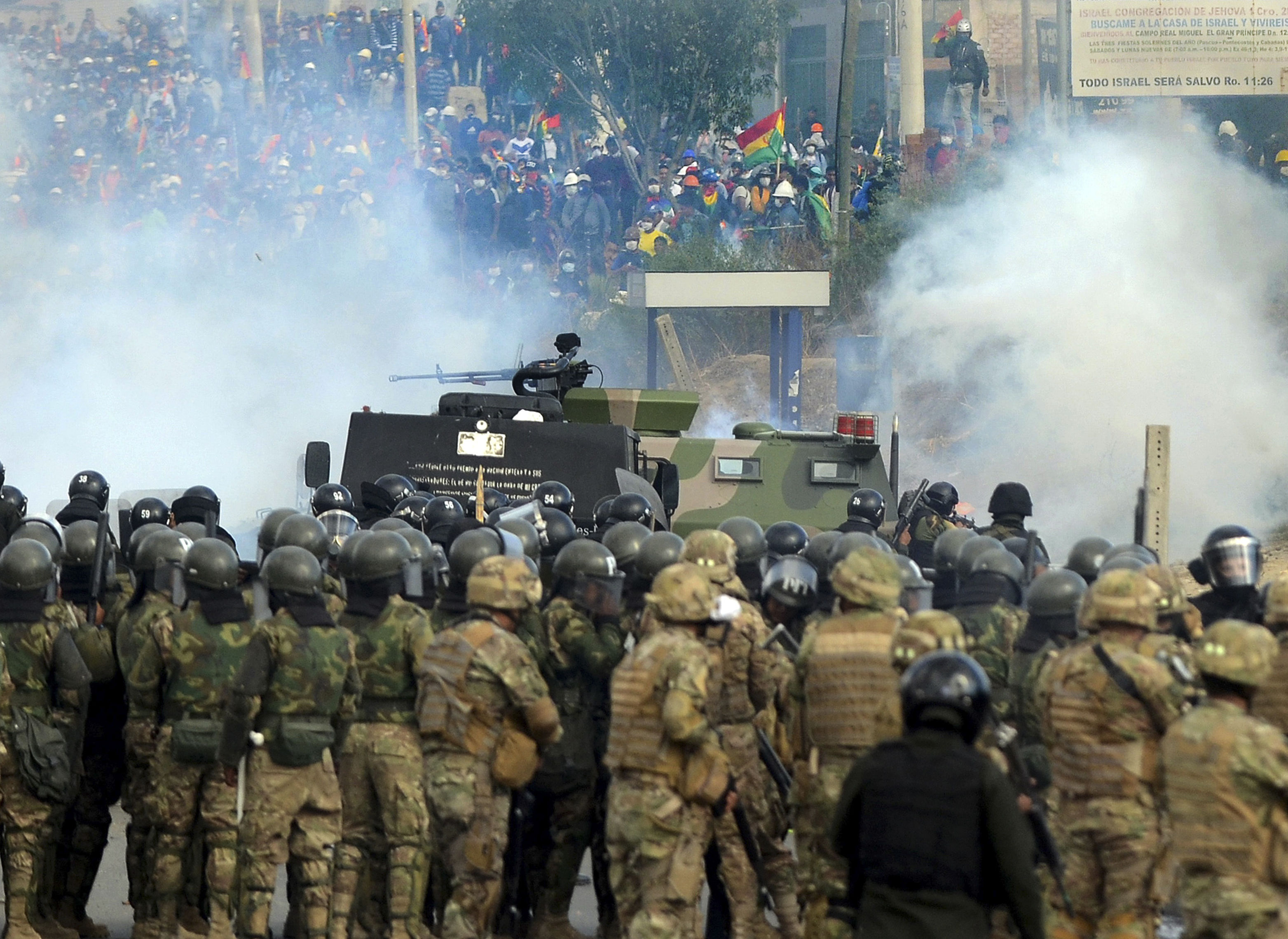
Bolivian riot police and soldiers clash with supporters of Bolivia’s ex-President Evo Morales during a protest against the interim government in Sacaba, Chapare province, Cochabamba department on November 15, 2019. – Bolivia’s interim president Jeanine Anez said Friday that exiled ex-president Evo Morales would have to “answer to justice” over election irregularities and government corruption if he returns. (Photo by STR / AFP)
LA PAZ, Bolivia — Bolivia’s interim leader Jeanine Anez said Friday that exiled ex-president Evo Morales would have to “answer to justice” if he returns, as his supporters clashed with security forces.
Morales resigned and fled to Mexico after losing the support of the security forces following weeks of protests over his disputed re-election that has seen 10 people killed and more than 400 wounded.
“He knows he has to answer to justice. There is electoral crime. There are many allegations of corruption in his government,” Conservative Christian Anez told journalists in La Paz.
The former president said Wednesday he was willing to return to bring peace to Bolivia.
Despite its interim nature, the new government has proved ruthless towards Morales’s left-wing allies.
Since proclaiming herself acting president on Tuesday, Anez’s administration has set about breaking ties with socialist Cuba and Nicolas Maduro’s Venezuela.
Foreign Minister Karen Longaric announced Friday that Venezuelan diplomats would be sent home for “violating diplomatic norms.”
“All the diplomatic personnel representing Maduro at Venezuela’s embassy in Bolivia will be allowed to leave the country for having interfered in internal state affairs,” said Longaric.
Bolivia also fired all its ambassadors except those to Peru and the Vatican.
‘False accusations’
Meanwhile, Havana slammed the arrest of four Cubans charged with financing Bolivian protests and said it would pull hundreds of healthcare workers from the country.
Cuba’s foreign ministry said the group — including two doctors — were arrested in possession of funds withdrawn from a bank to pay the living expenses of more than 100 Cuban health workers in the town of El Alto, neighboring La Paz.
“The arrest came under the slanderous presumption that the money was dedicated to financing protests,” the ministry said, rejecting the “false accusations.”
Longaric said earlier Cuba was repatriating 725 “cooperation officials” from Bolivia.
It is part of a concerted effort to reverse the last 13 years of foreign policy under former union leader Morales.
The government withdrew from two regional blocs — ALBA and UNASUR — made up of left-wing allies.
Anez’s first foreign policy decision after taking over was to recognize Venezuela’s opposition leader Juan Guaido as the country’s president, joining a group of around 50 countries.
Parliament speaker Guaido declared himself acting president in January in a direct challenge to Maduro’s authority.
Christopher Sabatini, senior fellow for Latin America at Chatham House, said Anez had her priorities wrong.
“Now is not the moment to weigh into the larger ideological battles in the region but to try to repair Bolivia’s torn political and social consensus,” said Sabatini, also a lecturer in the School of International and Public Affairs at Columbia University.
“Regional polarization played out on a national stage will only inflame divisions and make it more difficult to find a consensus exit to the polarized divisions in the country.”
Minor clashes
There were minor clashes between Morales supporters and security forces in La Paz on Friday, with protesters breaking down street barricades and fending off volleys of tear gas.
A group of mostly indigenous protesters had marched from El Alto to the seat of government in La Paz, which was protected by a police barricade.
Anez has come under fire for allegedly attacking the indigenous community in tweets that have since been deleted.
While the worst of those was found by AFP’s fact-checking service to be a fake, in another Anez refers to Morales’s Aymara community as “Satanists.”
Questioned about these messages, Anez accused the Morales administration of using “digital warriors” to falsify Twitter accounts.
Anez, 52, was deputy senate speaker before taking over the top job to avoid a power vacuum — a move endorsed by the Constitutional Court.
Those further up the political hierarchy had resigned along with Morales, leaving her as the highest ranking official in the country.
Protests have flared across Bolivia since Morales was declared the winner of the October 20 election, beating his nearest rival, centrist Carlos Mesa, by just enough to avoid a second round.
The Organization of American States recommended new elections after it found “irregularities that range from serious to indicative” in virtually every area they reviewed — technology, the chain of custody of ballots, integrity of the count and statistical projections.